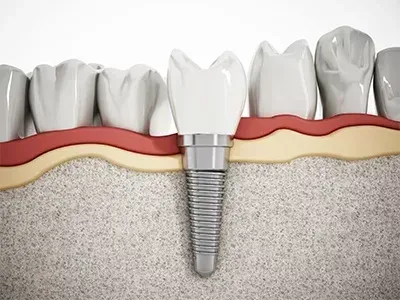
Dental Implants - Carmel Valley, CA
Dental Implants
It’s no understatement to say that dental implants are the biggest breakthrough in dentistry in the past century. Instead of just replacing the part of a tooth that you can see (like every other treatment), implants involve restoring tooth roots as well, using small metal posts placed into the jawbone. These serve as the foundation for the new teeth, creating a prosthetic that is the next best thing to nature. They can support crowns, bridges, and dentures, and thanks to the expertise of the team here at Del Mar Dental Arts, patients can have the entire implant procedure completed under one roof.
A Guide to Dental Implants: Restoring Smiles with Del Mar Dental Arts.
A Permanent Solution to Missing Teeth
Most tooth replacements simply sit on top of the gum line and rely on the remaining teeth for support, but not dental implants. With this state-of-the-art treatment, small titanium posts are placed into the jawbone to mimic tooth roots, and these are what hold a patient’s new teeth in place. Implants are just as strong and durable as natural teeth and can fully recreate their appearance as well, making them the most complete replacement available today. If you’re ready to finally and forever put your tooth loss behind you, give us a call today.


Benefits of Dental Implants
Because dental implants are held within the jawbone just like natural teeth, they offer a number of benefits you just won’t get with traditional bridges and dentures:
- Implanted teeth can be trusted to stay in place no matter what a patient is eating, meaning they can enjoy a varied and nutritious diet without their prosthetics shifting or breaking.
- Topped with custom-made porcelain restorations, dental implants are so realistic looking that only you and Dr. Alhamdi will be able to tell the difference between them and your actual teeth.
- Jawbone loss often occurs after tooth loss, and right now, dental implants are the only tooth replacement capable of stopping and even reversing this, protecting the foundation of the remaining teeth while filling in any gaps.
- Implants help maintain the jawbone so it can provide support and structure for the muscles of the face, enabling a patient to enjoy a more youthful appearance as the years go by.
- With the proper care, implants can be expected to last for decade after decade, with many enduring for the rest of a patient’s life.
Indications for Dental Implants
People with any number of missing teeth can get dental implants, they just need to have a healthy enough mouth and jawbone to support the new roots. After this has been confirmed with an exam, we’ll help a patient choose which type of restoration would best suit their needs:

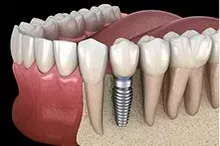
Missing One Tooth
After placing a dental implant between two healthy teeth, it can be attached to a new porcelain crown. Unlike with a regular bridge, implants don’t require the nearby teeth to be altered at all.
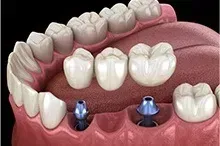
Missing Multiple Teeth
Bridges and partial dentures held in place using dental implants have a much stronger and longer-lasting hold compared to traditional removable prosthetics. They can be used to close large gaps and even those located throughout a patient’s mouth.
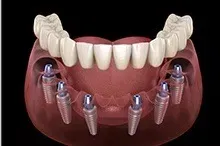
Missing All Your Teeth
Rather than replacing each tooth individually, just four to six implants is all that’s needed to anchor a full denture to the jawbone. Implant dentures are smaller and more stable than regular ones, creating a more comfortable and reliable fit that can be trusted to last for many years to come.
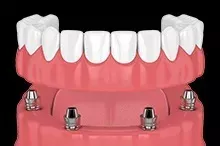
All-on-4/Teeth-in-a-Day
The All-on-4 procedure involves our team placing four special implants into a patient’s jaw and topping them with a new full denture all at the same appointment, fully restoring an entire row of teeth. This approach is commonly used for patients with longstanding tooth loss whose jawbones may be too weak to support regular implants. All-on-4 is designed to maximize a patient’s existing jawbone density to help them recover their smile in record time.
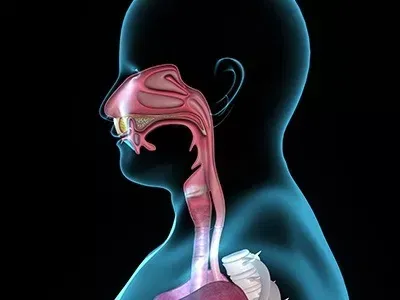
Sinus Lift
For patients wanting to replace their back teeth on their upper jaw, they often don’t have enough bone for an implant to sit in. Located right above this area of the mouth are the sinus cavities, and without adequate bone, the new roots could pierce their sensitive membrane, which we definitely don’t want to happen! With a minor surgical procedure completed in a single appointment, we can gently “lift” this membrane to create more space for a patient’s implants.
Bone Grafting
As touched on above, it’s normal for the jawbone to atrophy in the areas where a tooth has gone missing. Over time, this can make it too weak to support a dental implant. Bone grafting, on the other hand, can be used to build up and strengthen specific parts of the jawbone, using either a patient’s own bone or donated tissue. After this procedure, a patient will be given time to heal, and a few weeks later, their implant(s) can be placed into the newly fortified bone.
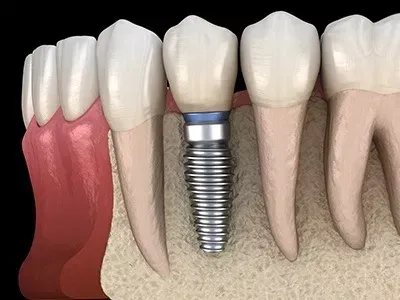

Start to Finish Convenience
Del Mar Dental Arts is one of the few dental offices in the area that’s able to perform every procedure associated with dental implants under one roof, including the surgical placement. Most other dental offices force their patients to run between different specialists, adding a lot of time, stress, and expense to the process. Here, you’ll be able to get everything you need in the same convenient location, helping you renew your smile in the most efficient and effective way possible.
Understanding the Cost of Dental Implants
Factors such as how many teeth a person is missing, where they are located in the mouth, and the condition of their jawbone can all affect the price of someone’s dental implant procedure, meaning the cost of the treatment is always different. We can give you an estimate of what you’ll be expected to pay at a one-on-one consultation. While it’s true that implants tend to cost more upfront than other treatments, they also last many, many times longer, which helps most patients save by comparison because they don’t have to periodically replace their new teeth.
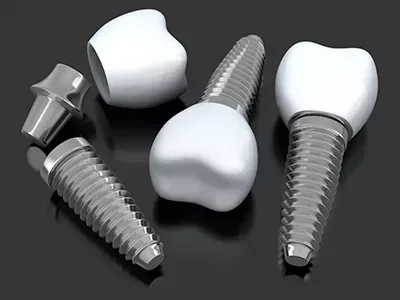
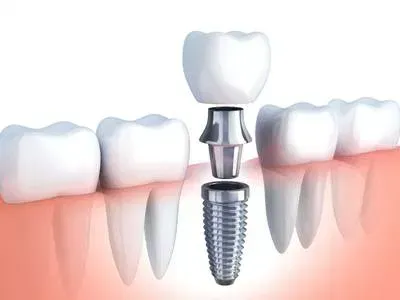
Dental Implant FAQs
Even after reading all of the above information on dental implants in Carmel Valley, you might still have some questions about the finer details of the process. Or, maybe you’re just curious to learn more. Either way, we’ve got you covered with these frequently asked questions about dental implants. If you have a question about implants that you don’t see answered here, feel free to contact us and a member of our team will be more than happy to provide you with an answer.









